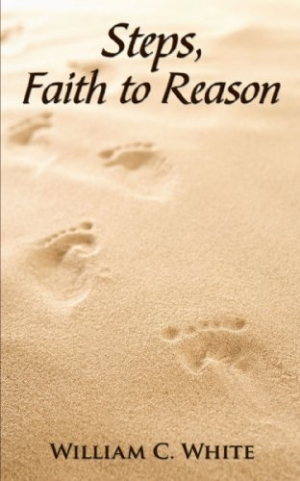Steps, Faith to Reason
“Fear was the first mother of the gods. Fear, above all, of death.” So wrote the Roman poet Lucretius, one of the eleven famous men showcased by William C. White in this marvelous and very readable history of the intellectual growth of Western civilization from the time of superstition to the Age of Reason. Man’s need to understand and deal with mortality is the driving theme of Steps, Faith to Reason.
White examines how men from Abraham and Seneca to Voltaire and Thomas Paine helped “establish the use of reason rather than faith as a guide for mankind.” He does this not by deriding religion but by tracking the side-by-side march of philosophy and theology through four thousand years of history. Starting with Abraham and then moving on to ten great thinkers, White examines how philosophers from Socrates to Sir Francis Bacon weighed and balanced what they believed with what they learned. While conceding, as historian Will Durant put it, that “as knowledge grows it clashes with mythology and theology,” White also notes how the men understood the debt they owed to religion, many acknowledging, as Thomas Paine did, that “choicest gift of God to man, the gift of reason.”
Organized and delivered like a college survey course, Steps, Faith to Reason is nothing short of the history of Western thought condensed into a single, easily understood volume. The first four chapters set the stage and tone for the course, the heart of which is delivered in eleven lecture-type sections, one for each of the key figures White has chosen to illustrate his theme. A final chapter neatly recounts the accomplishments of each man and the main points of the chapters devoted to them. The index is well organized, and the hundreds of footnotes are presented in a reference section that contains bibliographical sources.
Although his PhD is in agronomy rather than philosophy, White has done his homework not only on the principal subjects of his study but also on their contemporaries and the times in which they lived and wrote. In his chapter on Socrates, White also offers readers a survey of the Sophists, and with the discussion of Lucretius and Seneca comes an overview of the Epicurists. Rabbi Maimonides and Petrarch then serve as the medieval bridge to Bacon, Montaigne, Hume, and Voltaire. And White concludes his survey with the great voice of the American Revolution, Thomas Paine.
Some of these men, notably Bacon, “made room for both faith and reason,” notes White, while others, like Voltaire, came to the conclusion that “those who reason are not oft prone to believe.” Each, however, wrestled with the faith in which they were educated, or, like the ancients, sought to understand what mysteries the priests of their age were trying to explain through their rituals.
White shows how Abraham and each of the ten philosophers he examines contributed to the march of rationalism in the West. The author notes that this march often “clashed head-on with faith rooted to religious dogma of the Middle East,” but he points out that such conflict created modern Western civilization and led to the blossoming of what Montaigne called the “faculty that sets man above the rest of creation.”
Reviewed by
Mark McLaughlin
Disclosure: This article is not an endorsement, but a review. The publisher of this book provided free copies of the book and paid a small fee to have their book reviewed by a professional reviewer. Foreword Reviews and Clarion Reviews make no guarantee that the publisher will receive a positive review. Foreword Magazine, Inc. is disclosing this in accordance with the Federal Trade Commission’s 16 CFR, Part 255.

